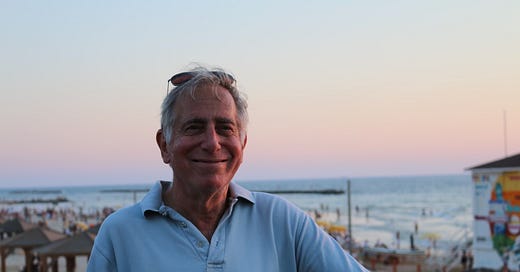Based on the transcript, here's a description of your podcast episode:
Tel Aviv Diary: A Conversation with Maggie Bar Tura
In this compelling episode of Tel Aviv Diary, host Marc Schulman sits down with longtime friend and social activist Maggie Bar-Tura for an intimate conversation about life, politics, and hope in contemporary Israel. Originally recorded before the recent 12-day Israel-Iran war, this interview offers a thoughtful perspective on navigating Israel's complex social and political landscape.
Bar Tura, an American-born Israeli who has lived in the country for over 50 years, shares her remarkable journey from anti-Vietnam War activist to kibbutz member to literary translator. Best known for her decades-long collaboration with renowned author Amos Oz, translating several of his works including "In the Land of Israel," she brings a unique perspective shaped by both her deep roots in Israeli society and her commitment to progressive Jewish values.
The conversation explores several key themes:
Personal Journey: Bar-Tura's path from 1960s American activism to finding her place in Israeli society, including her 30 years as a kibbutz member and unexpected career in construction management
Jewish Identity and Values: How Jewish sources inform her political views, particularly regarding treatment of refugees and asylum seekers
Post-October 7th Reflections: The challenge of maintaining progressive political views in the aftermath of tragedy, and how loss has strengthened rather than weakened her commitment to peace
Political Strategy: A frank discussion about the limitations of grassroots activism and the need for the Israeli left to focus on gaining actual political power
Religious Politics: The dangers of messianic Judaism in Israeli politics and the contrast between different approaches to Jewish learning and ethics
Throughout the interview, Bar Tura draws on historical parallels—from South African apartheid to Northern Ireland's troubles—to maintain hope that seemingly intractable conflicts can eventually find resolution. She emphasizes that change must come from leadership rather than street demonstrations, calling for a more strategic approach to political engagement.
The episode concludes on a cautiously optimistic note, acknowledging both the extraordinary social engagement of Israeli society and the remarkable creativity of its younger generation, while honestly confronting the significant challenges ahead.
This conversation offers listeners a nuanced view of Israeli society from someone who has witnessed its evolution over five decades, combining personal memoir with sharp political analysis.









Share this post